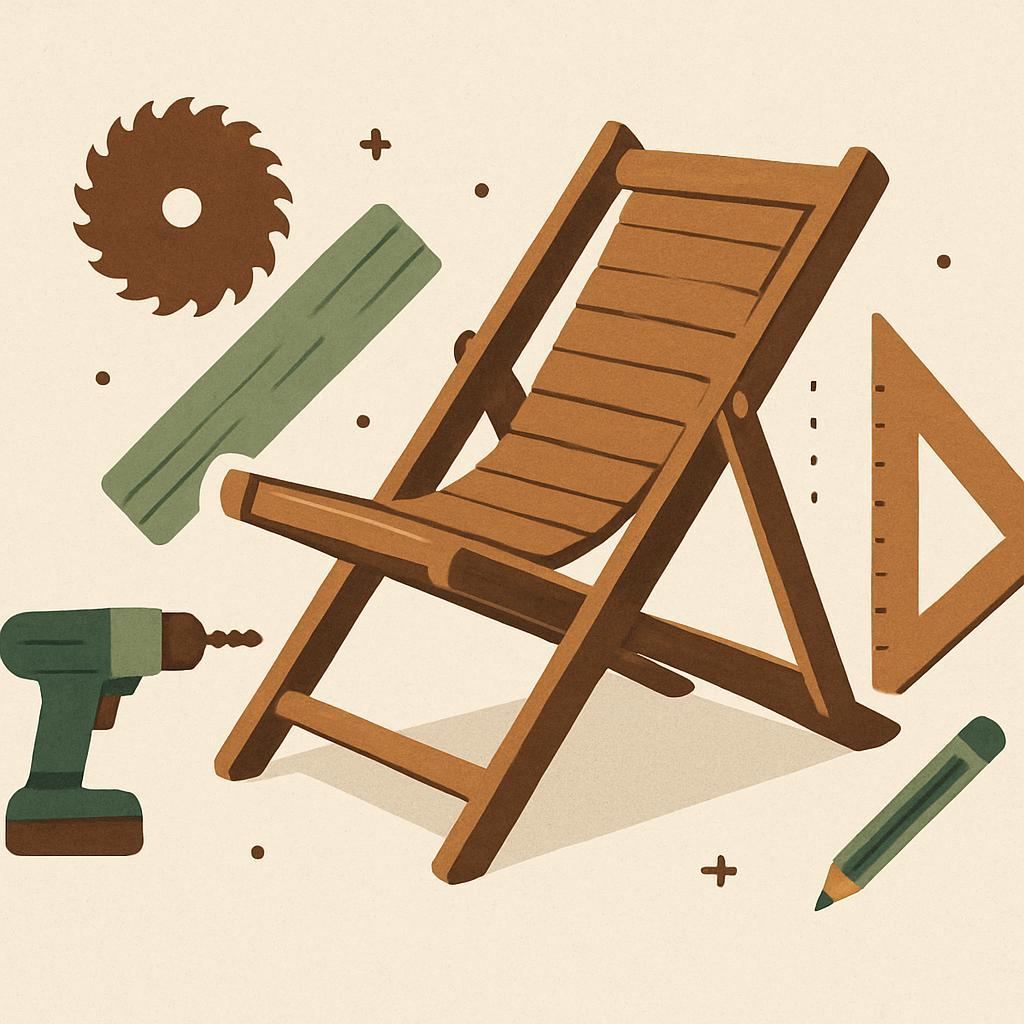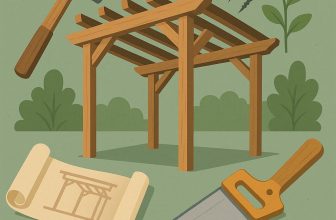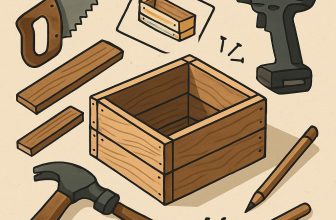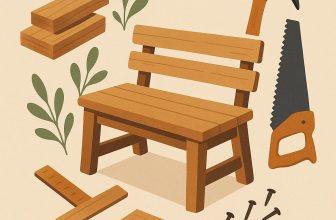
Picture a sunlit deck where a handmade chair greets you after a long day-yet the project didn't drain your savings. This matters to woodworking enthusiasts as building your own deck chairs sharpens techniques like cutting to size, joinery, and weatherproof finishing, while you tailor comfort and style to your space.
In this budget-kind DIY guide,you'll learn how to choose materials,plan a simple build,create a durable chair that resists the elements,and estimate costs with clear cut lists. You'll also gain tips on tools, finishing, maintenance, and design options to suit small balconies or roomy patios.
Choosing the Right Wood and Materials for Budget wooden Deck Chairs
Choosing the right wood for budget wooden deck chairs starts with balancing durability, look, and price. For outdoor seating that lasts, you wont boards that resist moisture, pests, and sun. On a tight budget,pressure-treated pine (PT pine) is a workhorse: cheap,widely available,and easy to cut and assemble. If you can stretch a little more, consider cedar or sustainably sourced reclaimed lumber for better natural rot resistance and character. Inspecting the source-whether new stock or reclaimed pallets-helps you avoid hidden defects that could undermine years of use.
When selecting wood, consider durability under outdoor conditions and the maintenance you're willing to perform. PT pine will warp or crack if not properly sealed, but a solid exterior finish can extend its life substantially. Cedar and redwood offer superior rot resistance with a lighter finish requirement, though they cost more per board. Reclaimed wood can be a fantastic budget option if you can evaluate moisture content and remove nails, but variability means planning for extra cuts and potential reinforcement. Regardless of type, using exterior-grade finishes and corrosion-resistant fasteners is essential to keep joints tight and surfaces smooth.
Practical sourcing and building tips help you maximize savings. Plan a simple, sturdy frame using a few long pieces and four legs, and reuse offcuts for slats to minimize waste. Always predrill to prevent splitting, especially with PT pine, cedar, or reclaimed boards. For joints, a combination of wood glue and stainless or coated screws delivers strength without needing fancy hardware. If you're short on time, choose stock that matches standard dimensions (2x4s and 1x4s) to reduce waste and costs while still delivering a comfortable, durable chair.
Use this rapid reference to compare common budget woods at a glance:
| Wood Type | Durability | Workability | estimated Cost* | Finish/Notes |
|---|---|---|---|---|
| Pressure-Treated Pine | Good rot resistance (treated) | Very easy to cut and screw | Low | Exterior seal or stain; predrill |
| Cedar | Very rot resistant | Easy to work; finishes well | Moderate | natural oils help; exterior finish recommended |
| Reclaimed Wood | Variable | Can be unpredictable; inspect first | Low to moderate | Check for nails,rot; treat before use |
| Redwood | Excellent rot resistance | Good to work with | Higher | exterior sealant preferred |
Get Instant Access to 16,000+ Woodworking Plans →
Smart Design Ideas for Comfortable and Sturdy DIY Deck Chairs
Design begins with the body. For comfortable, sturdy deck chairs, set the seat height around 17 inches from the ground and the seat depth near 18 inches to cradle the thighs without pinching the knees. Tilt the backrest to about 100-105 degrees, which encourages a relaxed lounging posture, and add a gentle curve to the back slats so your spine rests naturally. Space the slats for airflow and water drainage, and choose strong, straight-grained stock (2x4s or 2x3s) to keep weight manageable. Reinforce the frame with triangular under-seat braces and a cross-piece at the rear to resist racking in windy decks.
Solid joints matter as much as solid material. Mortise-and-tenon joints offer the best rigidity, but well-fitted dowels or pocket-screw joints with a dab of wood glue work well on a budget. Build the seat frame first, then attach the side rails with angled braces and a rear cross-brace. Pre-drill and countersink to prevent splitting,clamp while the glue dries,and use corrosion-resistant fasteners (stainless steel or galvanized). For even more durability, add a simple trim piece along the top edge to prevent splinters and improve comfort when you lean back.
Smart comfort is in the details. Add optional armrests by extending the side rails with rounded blocks and a smooth, contoured top. Create removable cushions with outdoor fabric and quick-release straps so you can wash or store them in harsh weather. Chamfer the edges of every slat for a softer touch, and seal or finish with a marine-grade coating to resist sun and rain. When space is at a premium, design the chair to stack lightly using a shared cross-brace so you can store several on a balcony or garage shelf.
To help choose materials wisely, here's a concise reference you can skim as you plan cuts and finishes.
| Material | Pros | Cons | Estimated Cost |
|---|---|---|---|
| Cedar | Rot-resistant, lightweight; ages well outdoors | Soft density; can dent | Low-Moderate |
| Pine (treated) | Very affordable; easy to work | Needs sealing; less durable long-term | Low |
| Teak | Excellent weather resistance; strong | Costly; heavier to work | high |
Get Instant Access to 16,000+ Woodworking Plans →
Step by Step Build Process for Wooden Deck Chairs on a Budget
Plan your budget deck chair by focusing on a simple, sturdy frame and a comfortable seat.Start with practical dimensions: a seat height about 17 inches, a backrest angle of 15-20 degrees, and a seat width around 18 inches. Sketch a clean side profile and a straightforward joints plan to minimize waste and avoid specialty tools. Using common outdoor-friendly woods like pressure-treated pine or cedar keeps costs down and improves weather resistance, while reducing the need for complex finishing work.
Step 1: Source materials and prep Gather the core components and inspect boards for warps, cracks, and loose knots. Prioritize outdoor-rated lumber (2x4s for the frame and 1×4 slats for the seat and back). Save money by checking salvage yards, discount outlets, or bundle deals; plan to buy only what you need to minimize waste.The quick kit below provides a practical starting point for a single chair.
| material | Qty | estimated Cost |
|---|---|---|
| Lumber (2x4s,8 ft) | 6-8 boards | $15-$25 |
| Slats (1×4) | 8-10 boards | $6-$12 |
| Exterior screws | 1 box | $6-$12 |
| Wood glue | 1 bottle | $3-$6 |
Step 2: Cut and assemble Transfer your patterns to the boards,cut to size with a handsaw or power saw guided by a straight edge,and smooth the edges with sandpaper. Drill pilot holes to prevent splitting, then glue and screw the frame together with exterior-grade fasteners. Start with the seat frame, attach legs, then add the backrest supports and the slatted seat.Always dry-fit first and clamp securely as you assemble.
Step 3: Finish and maintenance Wipe down, sand lightly between coats, and apply a protective finish suitable for outdoor use. Two thin coats of exterior varnish or penetrating sealant typically outperform a single thick coat. Check screws periodically and reapply sealant every season or two to keep your chairs looking sharp and ready for weather. If stored indoors during harsh winters, your budget chairs will last longer.
Get instant Access to 16,000+ Woodworking Plans →
Finishes and Weatherproofing to Extend the Life of Your Deck Chairs
Proper prep sets the foundation for lasting comfort. Start by cleaning the wood with a mild soap and water, then let it dry fully. Lightly sand using 120-150 grit to smooth rough grain and open pores.remove all dust with a tack cloth. If you're dealing with older, knotty pine or cedar, wipe with a damp cloth to lift any natural oils; this helps prevent finish not sticking in seams and knot areas.
Next, choose a finish that suits your climate and budget. For a natural look and easier maintenance, go with a penetrating oil such as tung oil or linseed oil; it soaks in and adds repellency without a thick film. If you want a tougher surface with minimal frequent reapplication, pick an exterior water-based polyurethane for a clear, durable coat. For seating that flexes with temperature and humidity, an exterior spar varnish offers UV protection and a flexible film. Avoid piling too many coats at once; two to three thin coats spread over a day yield the best balance of protection and color.
| Finish Option | Pros | Cons | Best For |
|---|---|---|---|
| Penetrating Oil | Natural look; easy reapplication | Limited UV protection; slower buildup | Cedar/pine; warm climates |
| Exterior Water-based Poly | Clear film; quick cure; easy cleanup | Film can peel in harsh sun; multiple coats needed | Budget projects; frequent refresh |
| exterior Spar Varnish | UV protection; flexible film | Slower cure; can amber | Outdoor furniture; joints |
Application tips: apply thin coats in a well-ventilated area, brushing with the grain and avoiding puddles. Sand lightly with 220 grit between coats and wipe away dust before the next layer.Let each coat cure fully according to the product label-typically 24 hours for oil-based or 2-4 hours for water-based finishes in moderate conditions. In climates with sun, wind, or rain exposure, plan for 2-3 coats and expect more frequent touch-ups.
Maintenance and care to extend life: inspect annually for cracks, peeling, or raised grain and address promptly to prevent water intrusion. store chairs with cushions indoors during harsh weather or invest in weatherproof covers. Clean surfaces periodically with a soft brush and mild soap; never use harsh chemicals that can break down the finish. This proactive approach will keep chairs attractive and comfortable for years without a frequent full refinishing.
Get Instant Access to 16,000+ Woodworking Plans →
Essential Tools and Safety Tips for DIY Wooden Chair Projects
Equipping yourself for DIY wooden chair projects starts with the right balance of essential tools and a safe workspace. Build your deck chairs on a budget by prioritizing versatile, durable basics: a dependable saw, a solid measuring setup, clamps, and a reliable drill. Plan your cuts carefully and double-check dimensions before you lift a blade, because accurate measurements save time, material, and frustration down the line.
core hand tools you'll rely on daily include a tape measure, a combination square, a sharp pencil, chisels, and a mallet or hammer. For power efficiency, a cordless drill with assorted bits, a jigsaw for curved profiles, and an orbital sander will cover most chair-building tasks. Keep blades sharp, replace worn bits, and store them in a magnetic tray or labeled case to reduce search-time and accidents.
Your safety gear and workspace setup matter as much as the tools.Protect your eyes with safety glasses, guard your ears with earmuffs or plugs, and wear a dust mask or respirator when sanding or routing. Clamp work securely to a sturdy workbench or sawhorses, and use push sticks on any table saw operations to keep hands clear. Maintain good ventilation and tidy as you go to avoid trip hazards and inhaling fine dust.
Make the most of your budget by planning a modular approach: cut multiple parts at once, pre-finish components where possible, and reuse scrap stock for jigs or mockups. Before you start, test-fit pieces dry, then apply finish in a well-ventilated area. keep a simple maintenance routine: wipe down tools after use, oil metal parts periodically, and sharpen edges when you notice grain tearing or chatter.
Get Instant Access to 16,000+ Woodworking Plans →
Budget Friendly Upgrades and Maintenance to Keep Your Chairs Like New
Maintaining your deck chairs on a budget starts with a simple, repeatable routine. Each season, give them a thorough wipe-down with mild soap and water, then inspect joints, screws, and slats for looseness or cracks. Tighten hardware and dab any loose wood with a drop of wood glue, clamping until dry. A quick sanding over rough patches with 120-grit sandpaper smooths splinters and primes the surface for finish, helping the next coat bond evenly.
Protection matters as much as care, and there are affordable finishes that deliver long-lasting results without breaking the bank. Choose a finish that fits your climate and upkeep tolerance, and apply in two thin coats for best results. The table below compares common options at a glance:
| Finish | Pros | Cons | Best For |
|---|---|---|---|
| Tung oil / penetrating oil | Beautiful grain; easy touch-ups | Requires reapplication; moderate water protection | Natural look, light-use comfort |
| Spar varnish / marine varnish | Excellent outdoor protection; flexible | longer cure time; can amber | Direct sun and rain exposure |
| Water-based polyurethane | Fast-drying; low odor | Less durable in harsh sun without UV guard | Budget-friendly refreshes |
Keep maintenance cadence simple with a schedule you can stick to. Monthly, give the chairs a quick wipe and a tightness check. Seasonal, lightly sand any rough spots, recoat, and address any loose joints. Use this quick checklist to stay on track:
- Monthly: wipe down, tighten screws, inspect for cracks.
- Seasonal: light sanding, recoat, re-seal exposed surfaces.
- After heavy rain or storms: dry thoroughly and inspect for swelling or warping.
Budget-friendly upgrades that maintain strength and comfort can be tackled in a weekend. Try these practical tweaks:
- Reinforce joints: apply wood glue to any loose mortises, clamp, and re-screw with stainless or bronze hardware to resist corrosion.
- Replace damaged slats: trim to fit,predrill,and fasten securely to avoid wobble.
- Protect the feet: add inexpensive felt pads or end-caps to protect floors and reduce wear.
- Seasonal storage: store under cover or with breathable chair covers to cut moisture exposure.
Get Instant Access to 16,000+ Woodworking Plans →
Q&A
What wood materials are best for budget wooden deck chairs and how do I choose them?
For budget-friendly outdoor chairs, start with pressure-treated pine or spruce-these are affordable and readily available, and they resist the elements with proper sealing. If you can stretch the budget, cedar or redwood offer better rot resistance and a nicer look with less maintenance, but still work for DIY projects. Check boards for straight grain, minimal warping, and avoid heavy knots; choose exterior-grade lumber and plan to seal all surfaces before assembly.
What basic tools and fasteners do I need to build sturdy deck chairs without breaking the bank?
You'll need the essentials: a saw, drill, screwdriver, measuring tape, square, clamps, and sandpaper or a sander for smooth edges. Use exterior-grade screws (deck screws) and wood glue, choosing stainless or coated fasteners to resist corrosion in the elements. If you can, borrow or reuse usable hardware from other projects to save even more, and pre-drill to prevent splitting.
How can I design a simple, comfortable deck chair that fits a small budget?
Start with a straightforward frame: two side panels, a slatted seat, and a slatted back with a gentle recline, using 2×4 or 2×3 stock. Keep the design lightweight and avoid complex joints-simpler cuts mean less waste and fewer mistakes. Add a small curved armrest or a comfortable tilt by angling the back slightly and attaching the slats with glue and screws for strength.
What finishes and maintenance steps help extend the life of DIY deck chairs?
Apply a weatherproof finish that seals all sides-ideally a penetrating stain or exterior-grade sealant-and follow with at least two coats for lasting protection. Sand lightly between coats to keep the surface smooth and ensure the finish adheres well. Reapply the finish every year or two,and consider storing chairs indoors or under covers during harsh weather to extend their life.
Concluding remarks
Ultimately, the takeaway is simple: with a smart plan, clean lines, and affordable materials, you can craft comfortable, durable deck chairs that feel tailor-made without breaking the bank. Measure, cut, and join with care, choose weather-resistant finishes, and you'll extend the life of your project and your budget alike. For woodworking enthusiasts, the value lies in rewarding problem solving-designing around constraints, mastering basic joinery, and translating ideas into something you can sit in. So pick a side project, or dive into another guide, adapt these steps, and turn ideas into real, usable furniture. Your deck awaits-start today, and enjoy the craft.







This guide is fantastic! I love the idea of building my own chairs, and the budget-friendly tips are super helpful. Can’t wait to get started!
Great tutorial! I appreciate the step-by-step instructions and the resource suggestions; this is just what I needed to kick off my backyard project!
Thanks for sharing this awesome guide! I’m excited to try my hand at making deck chairs and love the budget-friendly approach-perfect for a DIY newbie like me!
I’m glad to see so much enthusiasm for DIY projects! This guide makes it seem so achievable to create functional and stylish deck chairs without breaking the bank. Looking forward to seeing everyone’s finished creations!
I love how this guide empowers anyone to get creative with their outdoor space! Building my own deck chairs has been on my to-do list for ages, and now I feel ready to tackle it with these easy-to-follow tips!
I’m really inspired by this guide! It’s amazing how much creativity can go into DIY projects like these deck chairs, and with such practical advice, I feel confident I can create something great for my patio.
This guide is fantastic! I’ve always wanted to spruce up my backyard with some custom-made deck chairs, and the practical tips provided here have given me the motivation to finally get started. Can’t wait to see how they turn out!
This guide is a game-changer! I’m thrilled to see such easy-to-follow instructions and budget tips for building deck chairs that I can customize to fit my space perfectly. Can’t wait to get started!
I absolutely love this DIY guide! The thought of building my own deck chairs has always seemed daunting, but the clear instructions and budget-friendly tips have made it feel so much more attainable. I’m excited to give it a try and add some personal flair to my outdoor space!
This DIY guide is just what I needed! The step-by-step instructions and focus on affordability make it so easy to envision my own unique deck chairs. I’m eager to dive in and transform my outdoor area with my personal touch!
I’m so inspired by this guide as well! The thought of creating custom deck chairs on a budget makes it feel achievable, and reading everyone’s excitement motivates me to get going on my own project. Can’t wait to see what I come up with!
I’m so excited about this DIY guide! The idea of building my own deck chairs sounds fun and rewarding, plus the budget-friendly approach makes it even better. I can’t wait to personalize them and enjoy relaxing in my backyard!
This DIY guide is exactly what I was looking for! With clear instructions and budget-friendly ideas, I feel empowered to tackle this project and create beautiful deck chairs that reflect my style. Excited to bring my vision to life and enjoy my outdoor space!
This DIY guide is exactly what I was looking for! With clear instructions and budget-friendly ideas, I feel empowered to tackle this project and create beautiful deck chairs that reflect my style. Excited to bring my vision to life and enjoy my outdoor space!
This DIY guide has me really excited! Crafting budget-friendly deck chairs sounds like a fantastic way to add a personal touch to my patio while saving money, and I can’t wait to get started on my own designs and share them with everyone.
This DIY guide is exactly what I’ve been searching for! The combination of creativity and affordability in building my own deck chairs is thrilling, and I love the idea of making something unique for my outdoor space. I’m ready to roll up my sleeves and get started!
This DIY guide is super inspiring! The thought of building my own deck chairs really excites me, especially since it’s an affordable way to enhance my outdoor area. I’m eager to start crafting and customizing them to fit my style!
I’m so glad I found this DIY guide! The idea of building my own wooden deck chairs on a budget is not only practical but also incredibly fun. I can’t wait to gather my materials, get creative, and customize my chairs to perfectly suit my outdoor setting!
This DIY guide is fantastic! I’m all about finding ways to create stylish outdoor furniture without breaking the bank, and being able to build my own deck chairs sounds like a rewarding challenge. I can’t wait to see how my creations turn out!